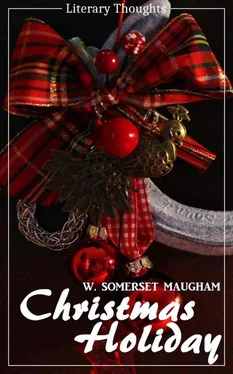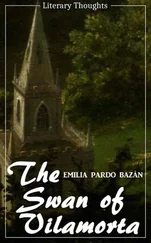Christmas Holiday by W. Somerset Maugham
Literary Thoughts Edition presents
Christmas Holiday,
by W. Somerset Maugham
Transscribed and Published by Jacson Keating (editor)
For more titles of the Literary Thoughts edition, visit our website: www.literarythoughts.com
All rights reserved. No part of this edition may be reproduced, stored in retrieval system, copied in any form or by any means, electronic, mechanical, photocopying, recording or otherwise transmitted without written permission from the publisher. You must not circulate this book in any format. For permission to reproduce any one part of this edition, contact us on our website: www.literarythoughts.com.
This edition is licensed for your personal enjoyment only. It may not be resold or given away to other people. If you would like to share this book with another person, please purchase an additional copy for each recipient. If you’re reading this book and did not purchase it, or it was not purchased for your use only, then please return to Amazon and purchase your own copy of the ISBN edition available below. Thank you for respecting the efforts of this edition.
With a journey before him, Charley Mason’s mother was anxious that he should make a good breakfast, but he was too excited to eat. It was Christmas Eve and he was going to Paris. They had got through the mass of work that quarter-day brought with it, and his father, having no need to go to the office, drove him to Victoria. When they were stopped for several minutes by a traffic block in Grosvenor Gardens, Charley, afraid that he would miss the train, went white with anxiety. His father chuckled.
“You’ve got the best part of half an hour.”
But it was a relief to arrive.
“Well, good-bye, old boy,” his father said, “have a good time and don’t get into more mischief than you can help.”
The steamer backed into the harbour and the sight of the grey, tall, dingy houses of Calais filled him with elation. It was a raw day and the wind blew bitter. He strode along the platform as though he walked on air. The Golden Arrow, powerful, rich and impressive, which stood there waiting for him, was no ordinary train, but a symbol of romance. While the light lasted he looked out of the window and he laughed in his heart as he recognised the pictures he had seen in galleries: sand dunes, with patches of grass grey under the leaden sky, cramped villages of poor persons’ houses with slate roofs, and then a broad, sad landscape of ploughed fields and sparse bare trees; but the day seemed in a hurry to be gone from the cheerless scene and in a short while, when he looked out, he could see only his own reflection and behind it the polished mahogany of the Pullman. He wished he had come by air. That was what he’d wanted to do, but his mother had put her foot down; she’d persuaded his father that in the middle of winter it was a silly risk to take, and his father, usually so reasonable, had made it a condition of his going on the jaunt that he should take the train.
Of course Charley had been to Paris before, half a dozen times at least, but this was the first time that he had ever gone alone. It was a special treat that his father was giving him for a special reason: he had completed a year’s work in his father’s office and had passed the necessary examinations to enable him to follow usefully his chosen calling. For as long as Charley could remember, his father and mother, his sister Patsy and he had spent Christmas at Godalming with their cousins the Terry-Masons; and to explain why Leslie Mason, after talking over the matter with his wife, had one evening, a smile on his kindly face, asked his son whether instead of coming with them as usual he would like to spend a few days in Paris by himself, it is necessary to go back a little. It is necessary indeed to go back to the middle of the nineteenth century, when an industrious and intelligent man called Sibert Mason, who had been head gardener at a grand place in Sussex and had married the cook, bought with his savings and hers a few acres north of London and set up as a market gardener. Though he was then forty and his wife not far from it they had eight children. He prospered, and with the money he made bought little bits of land in what was still open country. The city expanded and his market garden acquired value as a building site; with money borrowed from the bank he put up a row of villas and in a short while let them all on lease. It would be tedious to go into the details of his progress, and it is enough to say that when he died, at the age of eighty-four, the few acres he had bought to grow vegetables for Covent Garden, and the properties he had continued to acquire whenever opportunity presented, were covered with bricks and mortar. Sibert Mason took care that his children should receive the education that had been denied him. They moved up in the social scale. He made the Mason Estate, as he had somewhat grandly named it, into a private company and at his death each child received a certain number of shares as an inheritance. The Mason Estate was well managed and though it could not compare in importance with the Westminster or the Portman Estate, for its situation was modest and it had long ceased to have any value as a residential quarter, shops, warehouses, factories, slums, long rows of dingy houses in two storeys, made it sufficiently profitable to enable its proprietors, through no merit and little exertion of their own, to live like the gentlemen and ladies they were now become. Indeed, the head of the family, the only surviving child of old Sibert’s eldest son, a brother having been killed in the war and a sister by a fall in the hunting-field, was a very rich man. He was a Member of Parliament and at the time of King George the Fifth’s Jubilee had been created a baronet. He had tacked his wife’s name on to his own and was now known as Sir Wilfred Terry-Mason. The family had hopes that his staunch allegiance to the Tory Party and the fact that he had a safe seat would result in his being raised to the peerage.
Leslie Mason, youngest of Sibert’s many grandchildren, had been sent to a public school and to Cambridge. His share in the Estate brought him in two thousand pounds a year, but to this was added another thousand which he received as secretary of the company. Once a year there was a meeting attended by such members of the family as were in England, for of the third generation some were serving their country in distant parts of the Empire and some were gentlemen of leisure who were often abroad, and, with Sir Wilfred in the chair, he presented the highly satisfactory statement which the chartered accountants had prepared.
Leslie Mason was a man of varied interests. At this time he was in the early fifties, tall, with a good figure and, with his blue eyes, fine grey hair worn rather long, and high colour, of an agreeable aspect. He looked more like a soldier or a colonial governor home on leave than a house agent and you would never have guessed that his grandfather was a gardener and his grandmother a cook. He was a good golfer, for which pastime he had ample leisure, and a good shot. But Leslie Mason was more than a sportsman; he was keenly interested in the arts. The rest of the family had no such foibles and they looked upon Leslie’s predilections with an amused tolerance, but when, for some reason or other, one of them wanted to buy a piece of furniture or a picture, his advice was sought and taken. It was natural enough that he should know what he was talking about, for he had married a painter’s daughter. John Peron, his wife’s father, was a member of the Royal Academy and for a long time, between the ’eighties and the end of the century, had made a good income by painting pictures of young women in eighteenth-century costume dallying with young men similarly dight. He painted them in gardens of old-world flowers, in leafy bowers and in parlours furnished correctly with the chairs and tables of the period. But now when his pictures turned up at Christie’s they were sold for thirty shillings or two pounds. Venetia Mason had inherited quite a number when her father died, but they had long stood in a box-room, covered with dust, their faces to the wall; for at this time of day even filial affection could not persuade her that they were anything but dreadful. The Leslie Masons were not in the least ashamed of the fact that his grandmother had been a cook, indeed with their friends they were apt to make a facetious point of it, but it embarrassed them to speak of John Peron. Some of the Mason relations still had on their walls examples of his work; they were a mortification to Venetia.
Читать дальше












